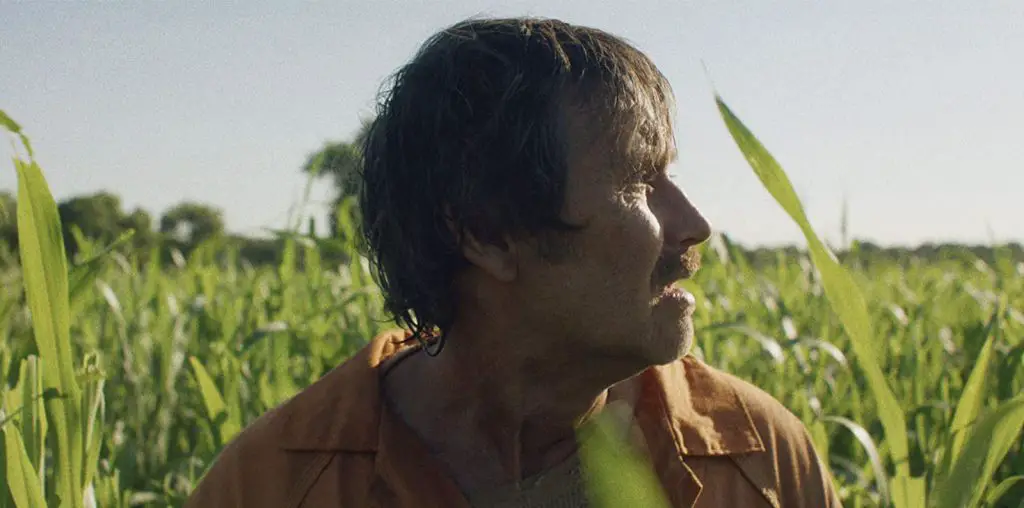
We had a not so quick break during which Mike put on his bootlegged Episode III DVD to see if it worked in our player since it didn’t play in his. This led to the great (and tedious) “Star Wars” debate of 2005. All I’m going to say is that jokes about Vader screaming “Noooo” are funny a maximum of 2 ½ times. Unless they are accompanied by a flash cartoon, in which case they are always funny.
As soon as we put the “Hanzo” disc into the player, it was a hit. Brendan exclaimed an “Oh my God” for the swirly, funkadelic menus. Will had to ask if it was brand new, to which we replied, “uh, no”. Nick applauded the amazing funk soundtrack. About five minutes later Will clued in, “so this was made in the ‘70’s eh?
How to begin to explain “Hanzo”? Well, let’s just say things had changed a lot in what people looked for in a commercial film in Japan between 1962 and 1972. By the ‘70’s exploitation was what it was all about, and there were many examples of chanbara that embraced the new conventions of nudity, excessive blood and gore and brain boggling examples of Sado-masochism. Out of all of these, “Hanzo” still manages to stand out, mostly for being so uncompromisingly out there with its exploitive elements. Imagine “Dirty Harry” if he was some sort of weird, Japanese super-masochist. Living in the Tokugawa Era. Who had to explain the plot to himself aloud all the time.
Hanzo, again played by Shintaro Katsu, sees himself as the one good cop in a sea of corruption. This leads to heated confrontations with his superiors, who see Hanzo as an unstable troublemaker. Hanzo’s gift lies in his ability to both endure and inflict pain, and it is his training methods that most people will remember. His militant opposition to decadence and corruption suggests echoes of Mishima, who had committed suicide just two years before “Hanzo” was made. At one point Hanzo even threatens to commit hariki and later boasts that he had done it and managed to put his guts back in. However, the blatant exploitation of the rest of the film pretty much nullifies any political messages, intended or not.
It doesn’t take long before we get to see Hanzo in action: getting his ex-con flunkies to pile cinderblocks on his legs while he kneels on a bed of jagged wood, pouring boiling water onto his member and then beating it with a stick (a sequence which includes possibly the best pull-focus in the history of cinema) and humping a large bag of rice. “Thank you Japan,” exclaimed my husband. Will was confused, “why is this in the movie?” Damon and Nick were merely stoked.
There was some discussion over whether not having pubic hair would be enough to identify a suspect these days and some dropped jaws for Hanzo’s “technique” and ceremonial disrobing. Will was again in shock, “this is right messed up for a ‘70’s action flick.” My favourite part was when the music changed during the rape scene to indicate the “oh so politically correct” transition from rape scene, to love scene. Reaction was mixed:
Will: “This is horrible”.
Nick: “This is amazing”.
Then there was another training session where Hanzo punches stone statues in a courtyard and a conversation where Hanzo claimed that he and two other men where all “brothers of a sort” because they had all slept with the same woman. Bob was asleep again, but somehow managed to wake up at exactly the right time: I can’t give it all away, but it involves a winch, a rope net and an exercise mat. Will was confused again, “I didn’t realize we were watching a porno.” The scene was so amazing even Katsu seemed like he had a hard time keeping a straight face.
Then, for no reason, Hanzo gets involved with these two kids who have to kill their terminally ill father and the film again takes a weird almost political turn. One of the poor kids in the scene looked so traumatized you could have sworn that they’d just punched his puppy. And then movie ended. And there was a theme song!
Rumblings from the Peanut Gallery: Although “Zatoichi” was the better film of the two, “Hanzo” was definitely the crowd favourite and there’s a good chance we’ll watch the other two sequels at a later date. My husband was curious as to how the Japanese audiences reacted to “Hanzo” when it was originally released. Will was just in awe. It gets easy to forget sometimes that not everyone watches these kinds of movies, so it was particularly satisfying to be able to pass him our copy of “Female Convict Scorpion: Prisoner 701” to continue his education.
